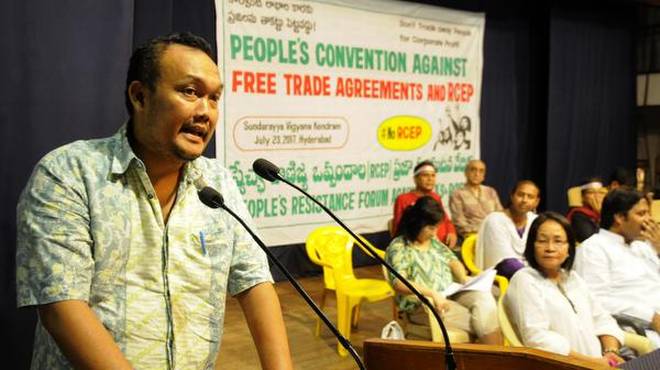Indian e-commerce platforms could suffer RCEP jolt

The Hindu | 25 July 2017
Indian e-commerce platforms could suffer RCEP jolt
by Nikhila Henry
Safe and cheap internet might remain a distant dream for general or e-commerce users in India if Regional Comprehensive Economic Partnership (SCEP) has its way, opined experts who oppose the country’s involvement in the Free Trade Agreement discussion taking place in the city.
While e-commerce in India witnessed a massive 50% surge in the past five years, just like the World Trade Organisation relaxed rules which promote oligopolies and monopolies in e-commerce sector, the RCEP will ensure the death of indigenous e-commerce start-ups. Moreover, free flow of data could compromise privacy rights in the future.
“Any company which provides services online acquires a wealth of data from the developing world users which can be bought and sold for profits. Infringement of privacy is but the tip of the iceberg.
Digital industrialisation through digital data centres, can use freely available data to push forward products of their companies to maintain control on the market,” Abhijit Das of Centre for WTO Studies, New Delhi told The Hindu. This would mean limited access to free and fair usage.
Experts in a 10-member panel maintained that, data was a raw material for the fourth industrial revolution and control of data would yield tremendous influence and profit-making over all future economic activity.
The ongoing RCEP negotiations in the city has a keen focus on e-commerce, with India pushing for services trade which includes migration of service professionals to different countries. The meet, reportedly focuses on issues including consumer protection, domestic regulatory frameworks, customs duties and data protection.
Unsafe data use
Speaking at the meet, Sanya Smith of Third World Network, Geneva said, “RCEP negotiations will serve the interests of big e-platforms including Google, Apple, Amazon, Facebook and China’s Alibaba network who work against government regulation.
For users, it will mean higher costs and unsafe data use”.
Domestic regulation on digitised services would also mean commitment to comply by norms prospectively. “Even if the Country has not developed a technology yet, in the future this technology could be under regulation based on the agreement signed now.
Such regulation can control and limit technological advances in a developing country like India which has miles to go before reaching its true technological potential,” said Vijaya Das, a city based e-commerce entrepreneur and activist who participated in the discussion.
The panel asked the Union Government to be thorough before allowing norms set by developed nations which can use the biggest resource which the Country has - data.





